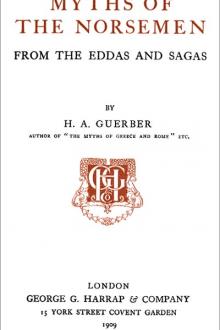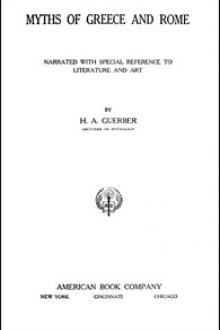Myths of the Norsemen, H. A. Guerber [ereader manga TXT] 📗

- Author: H. A. Guerber
- Performer: -
Book online «Myths of the Norsemen, H. A. Guerber [ereader manga TXT] 📗». Author H. A. Guerber
“His own house
Breidablik, on whose columns Balder graved
The enchantments that recall the dead to life.
For wise he was, and many curious arts,
Postures of runes, and healing herbs he knew;
Unhappy! but that art he did not know,
To keep his own life safe, and see the sun.”
Balder Dead (Matthew Arnold).
As it was so natural for Balder the beautiful to be smiling and happy, the gods were greatly troubled when on a day they began to notice a change in his bearing. Gradually the light died out of his blue eyes, a careworn look came into his face, and his step grew heavy and slow. Odin and Frigga, seeing their beloved son’s evident depression, tenderly implored him to reveal the cause of his silent grief. Balder, yielding at last to their anxious entreaties, confessed that his slumbers, instead of being peaceful and restful as of yore, had been strangely troubled of late by dark and oppressive dreams, which, although he could not clearly remember them when he awoke, constantly haunted him with a vague feeling of fear.
“To that god his slumber
Was most afflicting;
His auspicious dreams
Seemed departed.”
Lay of Vegtam (Thorpe’s tr.).
When Odin and Frigga heard this, they were very uneasy, but declared that nothing would harm their universally beloved son. Nevertheless, when the anxious parents further talked the matter over, they confessed that they also were oppressed by strange forebodings, and, coming at last to believe that Balder’s life was really threatened, they proceeded to take measures to avert the danger.
Frigga sent her servants in every direction, with strict charge to prevail upon all living creatures, all plants, metals, stones—in fact, every animate and inanimate thing—to register a solemn vow not to harm Balder. All creation readily took the oath, for there was nothing on earth which did not love the radiant god. So the servants returned to Frigga, telling her that all had been duly sworn save the mistletoe, growing upon the oak stem at the gate of Valhalla, and this, they added, was such a puny, inoffensive thing that no harm could be feared from it.
“On a course they resolved:
That they would send
To every being,
Assurance to solicit,
Balder not to harm.
All species swore
Oaths to spare him;
Frigg received all
Their vows and compacts.”
Sæmund’s Edda (Thorpe’s tr.).
Frigga now resumed her spinning in great content, for she felt assured that no harm could come to the child she loved above all.
Odin, in the meantime, had resolved to consult one of the dead Vala or prophetesses. Mounted upon his eight-footed steed Sleipnir, he rode over the tremulous bridge Bifröst and over the weary road which leads to Giallar and the entrance of Nifl-heim, where, passing through the Helgate and by the dog Garm, he penetrated into Hel’s dark abode.
“Uprose the king of men with speed,
And saddled straight his coal-black steed;
Down the yawning steep he rode,
That leads to Hela’s drear abode.”
Descent of Odin (Gray).
Odin saw to his surprise that a feast was being spread in this dark realm, and that the couches had been covered with tapestry and rings of gold, as if some highly honoured guest were expected. But he hurried on without pausing, until he reached the spot where the Vala had rested undisturbed for many a year, when he began solemnly to chant a magic spell and to trace the runes which had the power of raising the dead.
“Thrice pronounc’d, in accents dread,
The thrilling verse that wakes the dead:
Till from out the hollow ground
Slowly breath’d a sullen sound.”
Descent of Odin (Gray).
Suddenly the tomb opened, and the prophetess slowly rose, inquiring who had dared thus to trouble her long rest. Odin, not wishing her to know that he was the mighty father of gods and men, replied that he was Vegtam, son of Valtam, and that he had awakened her to inquire for whom Hel was spreading her couches and preparing a festive meal. In hollow tones, the prophetess confirmed all his fears by telling him that the expected guest was Balder, who was destined to be slain by Hodur, his brother, the blind god of darkness.
“Hodur will hither
His glorious brother send;
He of Balder will
The slayer be,
And Odin’s son
Of life bereave.
By compulsion I have spoken;
Now I will be silent.”
Sæmund’s Edda (Thorpe’s tr.).
Despite the Vala’s evident reluctance to speak further, Odin was not yet satisfied, and he prevailed upon her to tell him who would avenge the murdered god and call his slayer to account. For revenge and retaliation were considered as a sacred duty by the races of the North.
Then the prophetess told him, as Rossthiof had already predicted, that Rinda, the earth-goddess, would bear a son to Odin, and that Vali, as this child would be named, would neither wash his face nor comb his hair until he had avenged upon Hodur the death of Balder.
“In the caverns of the west,
By Odin’s fierce embrace comprest,
A wondrous boy shall Rinda bear,
Who ne’er shall comb his raven hair,
Nor wash his visage in the stream,
Nor see the sun’s departing beam,
Till he on Hoder’s corse shall smile
Flaming on the fun’ral pile.”
Descent of Odin (Gray).
When the reluctant Vala had thus spoken, Odin next asked: “Who would refuse to weep at Balder’s death?” This incautious question showed a knowledge of the future which no mortal could possess, and immediately revealed to the Vala the identity of her visitor. Therefore, refusing to speak another word, she sank back into the silence of the tomb, declaring that none would be able to lure her out again until the end of the world was come.
“Hie thee hence, and boast at home,
That never shall inquirer come
To break my iron sleep again,
Till Lok has burst his tenfold chain;
Never, till substantial Night
Has reassum’d her ancient right:
Till wrapt in flames, in ruin hurl’d,
Sinks the fabric of the world.”
Descent of Odin (Gray).
Odin having learned the decrees of Orlog (fate), which he knew could not be set aside, now remounted his steed, and sadly wended his way back to Asgard, thinking of the time, not far distant, when his beloved son would no more be seen in the heavenly abodes, and when the light of his presence would have vanished for ever.
Loki and Hodur
C. G. Qvarnström
On entering Glads-heim, however, Odin was somewhat reassured by the intelligence, promptly conveyed to him by Frigga, that all things under the sun had promised that they would not harm Balder, and feeling convinced that if nothing would slay their beloved son he must surely continue to gladden gods and men with his presence, he cast care aside and resigned himself to the pleasures of the festive board.
The playground of the gods was situated on the green plain of Ida, and was called Idavold. Here the gods would resort when in sportive mood, and their favourite game was to throw their golden disks, which they could cast with great skill. They had returned to this wonted pastime with redoubled zest since the cloud which had oppressed their spirits had been dispersed by the precautions of Frigga. Wearied at last, however, of the accustomed sport, they bethought them of a new game. They had learned that Balder could not be harmed by any missile, and so they amused themselves by casting all manner of weapons, stones, etc., at him, certain that no matter how cleverly they tried, and how accurately they aimed, the objects, having sworn not to injure him, would either glance aside or fall short. This new amusement proved to be so fascinating that soon all the gods gathered around Balder, greeting each new failure to hurt him with prolonged shouts of laughter.
These bursts of merriment excited the curiosity of Frigga, who sat spinning in Fensalir; and seeing an old woman pass by her dwelling, she bade her pause and tell what the gods were doing to provoke such great hilarity. The old woman was none other than Loki in disguise, and he answered Frigga that the gods were throwing stones and other missiles, blunt and sharp, at Balder, who stood smiling and unharmed in their midst, challenging them to touch him.
The goddess smiled, and resumed her work, saying that it was quite natural that nothing should harm Balder, as all things loved the light, of which he was the emblem, and had solemnly sworn not to injure him. Loki, the personification of fire, was greatly chagrined upon hearing this, for he was jealous of Balder, the sun, who so entirely eclipsed him and who was generally beloved, while he was feared and avoided as much as possible; but he cleverly concealed his vexation, and inquired of Frigga whether she were quite sure that all objects had joined the league.
Frigga proudly answered that she had received the solemn oath of all things, a harmless little parasite, the mistletoe, which grew on the oak near Valhalla’s gate, only excepted, and this was too small and weak to be feared. This information was all that Loki wanted, and bidding adieu to Frigga he hobbled off. As soon as he was safely out of sight, however, he resumed his wonted form and hastened to Valhalla, where, at the gate, he found the oak and mistletoe as indicated by Frigga. Then by the exercise of magic arts he imparted to the parasite a size and hardness quite unnatural to it.
From the wooden stem thus produced he deftly fashioned a shaft with which he hastened back to Idavold, where the gods were still hurling missiles at Balder, Hodur alone leaning mournfully against a tree the while, and taking no part in the game. Carelessly Loki approached the blind god, and assuming an appearance of interest, he inquired the cause of his melancholy, at the same time artfully insinuating that pride and indifference prevented him from participating in the sport. In answer to these remarks, Hodur pleaded that only his blindness deterred him from taking part in the new game, and when Loki put the mistletoe-shaft in his hand, and led him into the midst of the circle, indicating the direction of the novel target, Hodur threw his shaft boldly. But to his dismay, instead of the loud laughter which he expected, a shuddering cry of horror fell upon his ear, for Balder the beautiful had fallen to the ground, pierced by the fatal mistletoe.
“So on the floor lay Balder dead; and round
Lay thickly strewn swords, axes, darts, and spears,
Which all the Gods in sport had idly thrown
At Balder, whom no weapon pierced or clove;
But in his breast stood fixed the fatal bough
Of mistletoe, which Lok, the Accuser, gave
To Hoder, and unwitting Hoder threw—
’Gainst that alone had Balder’s life no charm.”
Balder Dead (Matthew Arnold).
In dire anxiety the gods crowded around their beloved companion, but alas! life was quite extinct, and all their efforts to revive the fallen sun-god were unavailing. Inconsolable at their loss, they now turned angrily upon Hodur, whom they would there and then have slain had they not been restrained by the law of the gods that no wilful deed of violence should desecrate their peace-steads. The sound of their loud lamentation brought the goddesses in hot haste to the dreadful scene, and when Frigga saw that her





Comments (0)